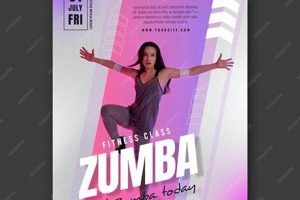Opportunities to participate in complimentary Zumba classes within the Boston metropolitan area offer residents and visitors access to a popular fitness program at no cost. These sessions, often held in community centers, parks, or as promotional events by local gyms, provide an accessible means to engage in physical activity. As an example, a park might host a weekly Zumba session during the summer months, open to all members of the public without requiring prior registration or payment.
The availability of accessible fitness options addresses several key societal needs. Public health is enhanced by promoting exercise and reducing sedentary lifestyles. Furthermore, it fosters a sense of community by bringing people together in a shared activity. Historically, such free programs have emerged as a response to the growing awareness of health disparities and the need to democratize access to wellness resources.
The following sections will delve into the specific locations where complimentary classes can be found, the types of organizations that sponsor them, and tips for maximizing the benefits of participation. Subsequent discussion will also examine the potential impact of these programs on individual well-being and the overall health of the city.
Guidance for Leveraging Complimentary Zumba in Boston
This section provides essential guidance for individuals seeking to participate in cost-free Zumba sessions within the Boston area, maximizing the potential benefits while mitigating common challenges.
Tip 1: Conduct Thorough Research: Prior to attending any free Zumba class in Boston, diligent research is paramount. Consult local community center websites, park district schedules, and online event listings. Verify the instructor’s credentials and read participant reviews to ensure a satisfactory experience.
Tip 2: Confirm Class Details: Schedules for free programs are often subject to change. It is crucial to confirm the date, time, and location of the class directly with the hosting organization or instructor shortly before attending. Unforeseen cancellations or venue alterations can be avoided through proactive communication.
Tip 3: Arrive Prepared: Like any physical activity, Zumba requires adequate preparation. Individuals should wear comfortable athletic clothing, supportive footwear suitable for dance-based movement, and bring a water bottle to maintain hydration throughout the session.
Tip 4: Be Mindful of Space and Etiquette: Free classes tend to attract a larger number of participants. Exercise spatial awareness and be respectful of others during the session. Avoid disruptive behavior, such as excessive talking or obstructing the instructor’s view.
Tip 5: Gauge Physical Limitations: Before participating, assess personal fitness levels and any pre-existing medical conditions. Communicate limitations to the instructor and modify movements as needed. Avoiding overexertion is essential for preventing injuries.
Tip 6: Utilize Available Resources: Many free Zumba sessions are offered in conjunction with other community wellness programs. Explore these resources, such as nutrition workshops or health screenings, to enhance overall well-being.
Tip 7: Provide Feedback: Constructive feedback is valuable for program improvement. Offer your insights to the instructor or organizing body regarding the class structure, accessibility, and overall experience.
Consistent application of these guidelines will enhance the individual’s engagement and derive optimum health advantages, thus contributing positively to the area’s well-being.
The final part of this article will present considerations about the future of free exercise initiatives and their significance.
1. Accessibility
Accessibility is a cornerstone of successful complimentary Zumba programs within Boston. It determines the extent to which diverse populations can participate and benefit from these fitness opportunities. Effective accessibility strategies address various barriers that might otherwise prevent individuals from engaging with these resources.
- Geographic Proximity
The location of free Zumba classes significantly impacts participation rates. Sessions offered in centrally located areas, easily reachable by public transportation or within walking distance of residential neighborhoods, tend to attract a larger and more diverse audience. Conversely, classes held in remote or difficult-to-access locations may exclude individuals without reliable transportation. For example, sessions hosted in community centers near subway stops or bus routes enhance accessibility for individuals with limited transportation options.
- Scheduling Flexibility
Scheduling considerations play a vital role in determining accessibility. Classes offered during non-traditional hours, such as evenings or weekends, accommodate individuals with work commitments or family responsibilities. Similarly, offering multiple sessions throughout the week increases the likelihood that individuals can find a class that fits their schedule. For instance, a free Zumba session offered on a Saturday morning caters to those who cannot attend weekday classes due to work or school.
- Physical Inclusivity
Accessibility encompasses the physical environment in which classes are held. Venues should be wheelchair-accessible and equipped with appropriate amenities, such as accessible restrooms and changing rooms. Instructors should be trained to adapt movements and provide modifications for individuals with physical limitations or disabilities. For example, offering chair-based Zumba variations allows individuals with mobility issues to participate fully in the class.
- Informational Transparency
Clear and accessible communication about free Zumba classes is essential for maximizing participation. Information about class schedules, locations, and instructors should be readily available online and through community outreach efforts. Translation services should be provided to ensure that non-English speakers can access information about the program. For instance, posting class schedules in multiple languages on a community center website promotes inclusivity and accessibility.
The implementation of these accessibility measures directly influences the success and impact of free Zumba programs in Boston. By addressing geographic, scheduling, physical, and informational barriers, these programs can effectively reach and engage a wider range of participants, promoting health equity and community well-being across the city.
2. Community Building
Free Zumba programs in Boston function as social catalysts, extending beyond mere fitness activities to foster interpersonal connections and collective identity within diverse communities. These programs offer accessible platforms for individuals from varied backgrounds to interact, collaborate, and build relationships, thereby strengthening the social fabric of the city.
- Shared Experience and Social Interaction
Participation in a group fitness activity, such as Zumba, creates a shared experience that encourages interaction among participants. The synchronized movements, shared laughter, and mutual support during the class break down social barriers and foster a sense of camaraderie. For example, individuals who may not otherwise interact in their daily lives find common ground in the shared pursuit of physical fitness, leading to conversations, friendships, and a strengthened sense of belonging.
- Cross-Cultural Engagement
Boston’s diverse population benefits from free Zumba programs that bring together individuals from different cultural backgrounds. The universal language of music and dance transcends cultural boundaries, creating an inclusive environment where participants can learn about and appreciate different traditions. For instance, a Zumba class incorporating Latin rhythms and movements can expose participants to Hispanic culture, fostering cross-cultural understanding and appreciation.
- Social Support Networks
Free Zumba programs facilitate the formation of social support networks among participants. Regular attendance provides opportunities for individuals to connect with others who share similar interests and goals, creating a sense of community and mutual support. These networks can extend beyond the classroom, providing individuals with emotional support, encouragement, and resources to help them achieve their health and wellness goals. For example, participants may form walking groups or healthy eating clubs outside of class, further strengthening their bonds and promoting overall well-being.
- Community Identity and Pride
The success of free Zumba programs can contribute to a stronger sense of community identity and pride. These programs often become a source of local pride, showcasing the community’s commitment to health and wellness. The positive energy and sense of camaraderie generated by these programs can spill over into other aspects of community life, fostering a more vibrant and engaged citizenry. For instance, a successful free Zumba program in a neighborhood park can attract new residents, boost local businesses, and enhance the overall quality of life in the area.
These dimensions of community building highlight the significant social impact of Boston’s complimentary Zumba initiatives. By providing accessible, engaging, and culturally inclusive activities, these programs foster social connections, promote cross-cultural understanding, and strengthen community bonds, thereby contributing to a more vibrant and resilient urban environment.
3. Instructor Qualifications
The qualifications of instructors delivering complimentary Zumba sessions in Boston are paramount to ensuring participant safety, program efficacy, and the overall reputation of these initiatives. Comprehensive understanding of appropriate certifications, training, and experience is crucial for individuals seeking to engage in these activities, as well as for organizations responsible for their provision.
- Certification and Licensing
Possession of current, valid Zumba instructor certifications is a baseline requirement. These certifications, issued by Zumba Fitness, LLC, demonstrate that an instructor has completed a standardized training program covering fundamental Zumba steps, choreography techniques, and basic safety protocols. Additional certifications in related fitness disciplines, such as group fitness instruction or personal training, can further enhance an instructor’s qualifications. The absence of valid certification raises concerns about the instructor’s competency and potential risks to participants. The presence of an instructor’s active license should be readily displayed to provide participants reassurance.
- CPR and First Aid Training
Emergency preparedness is a critical aspect of instructor competency. All instructors should hold current certifications in cardiopulmonary resuscitation (CPR) and basic first aid. This training equips them with the skills necessary to respond effectively to medical emergencies that may arise during class, such as injuries or sudden illnesses. Failure to maintain current CPR and first aid certifications can jeopardize participant safety in the event of an unforeseen medical incident. Emergency protocols should be visible and well documented within the class setting.
- Experience and Expertise
Beyond certifications, practical experience is a valuable indicator of instructor proficiency. Instructors with a proven track record of delivering engaging and effective Zumba classes are more likely to provide a positive and safe experience for participants. Experience allows instructors to adapt their teaching style to accommodate diverse fitness levels and physical limitations. Novice instructors, while potentially enthusiastic, may lack the experience necessary to manage a large class effectively or address unexpected challenges. A history of positive participant reviews should be investigated when possible.
- Insurance Coverage
Appropriate liability insurance coverage is essential for protecting both the instructor and the sponsoring organization from potential legal claims arising from injuries or incidents occurring during class. Insurance coverage demonstrates a commitment to risk management and provides financial protection in the event of an accident. Participants should inquire about the insurance coverage held by the instructor or sponsoring organization prior to engaging in free Zumba sessions. Verification of insurance policy and period coverage is advisable.
The aforementioned components serve as vital benchmarks for evaluating the caliber of leadership in any complimentary Zumba venture in Boston. Diligence in confirming credentials, experience, and preparedness not only safeguard participants but also contribute to the enduring viability and esteem of fitness programs across the community.
4. Location Convenience
The accessibility of “free zumba boston” programs is inextricably linked to the convenience of their locations. The ease with which individuals can reach a Zumba class directly impacts participation rates and, consequently, the overall success of the initiative. Locations that are readily accessible via public transportation, within walking distance of residential areas, or offer ample parking are more likely to attract a wider audience. Conversely, classes situated in geographically isolated areas or locations with limited transportation options will inherently restrict accessibility, regardless of the program’s inherent value.
Consider, for example, a free Zumba class held in a community center located directly on a major bus route and a short walk from a subway station. This class is likely to draw participants from various neighborhoods, including those who rely on public transport. Alternatively, a class offered at a facility requiring a long drive and lacking readily available parking might be inaccessible to individuals without a personal vehicle or those who face mobility challenges. In practical terms, the strategic selection of locations is a critical factor in maximizing the reach and inclusivity of these complimentary fitness programs. It also effects the impact of the classes on health in the Boston area.
In summary, location convenience serves as a foundational element of “free zumba boston” initiatives. Overcoming logistical barriers by strategically positioning classes in accessible locations is essential for ensuring widespread participation and maximizing the beneficial impact of these programs on the health and well-being of Boston residents. Challenges such as limited funding or facility availability must be addressed creatively to prioritize convenient locations and enhance accessibility, ultimately contributing to the broader goal of promoting fitness and community engagement.
5. Schedule Reliability
Schedule reliability is a pivotal component in the success and sustained impact of complimentary Zumba initiatives within Boston. Consistent adherence to published class schedules directly influences participant engagement, community trust, and the overall effectiveness of these programs in promoting fitness and well-being.
- Impact on Participant Attendance
Consistent and predictable class schedules encourage regular attendance. Participants are more likely to integrate free Zumba sessions into their routines when they can rely on classes occurring as advertised. Unpredictable schedule changes or frequent cancellations erode participant trust and lead to decreased attendance rates. For example, a class consistently held every Tuesday evening at 6:00 PM will foster greater commitment than one with erratic scheduling.
- Influence on Program Reputation
Reliable schedules contribute significantly to the program’s reputation within the community. A reputation for consistency enhances the program’s credibility and attracts new participants through positive word-of-mouth referrals. Conversely, a program plagued by frequent schedule disruptions develops a negative image, deterring potential participants and undermining community support. The local communities’ commitment is greatly affected by a program’s image.
- Effect on Resource Allocation
Dependable class schedules facilitate efficient resource allocation. Instructors, venues, and support staff can be scheduled effectively when class times are predictable and consistently maintained. Unreliable schedules lead to wasted resources, such as unused facility space or idle instructors, diminishing the program’s cost-effectiveness. When scheduling is reliable, resources will not be waisted.
- Promotion of Long-Term Adherence
Consistent schedules promote long-term adherence to fitness routines. Participants who can depend on the availability of free Zumba classes are more likely to make them a regular part of their lifestyle. Predictability reduces barriers to participation, making it easier for individuals to prioritize their health and maintain an active lifestyle over the long term. Consistent Zumba schedules promotes long-term fitness.
The preceding points underscore the integral role of schedule reliability in the success of free Zumba programs in Boston. Maintaining consistent and predictable class schedules is not merely an administrative detail; it is a fundamental element that directly impacts participant engagement, program reputation, resource utilization, and the long-term effectiveness of these initiatives in fostering health and well-being across the city.
6. Program Quality
Program quality profoundly influences the tangible benefits derived from complimentary Zumba initiatives in Boston. The provision of free classes, while commendable in principle, does not inherently guarantee positive outcomes. A direct correlation exists between the quality of the Zumba program, encompassing elements such as instructor competence, choreography, and the overall learning environment, and its capacity to deliver meaningful improvements in participants’ physical fitness, mental well-being, and community engagement. For instance, a class led by a certified instructor with a well-structured routine is far more likely to result in demonstrable improvements in cardiovascular health and coordination than a poorly organized session conducted by an unqualified individual. Similarly, a class incorporating diverse music and dance styles can foster a more inclusive and engaging environment, enhancing social interaction and cultural appreciation among participants.
The absence of robust program quality control measures can undermine the potential benefits of free Zumba classes and, in certain cases, even pose risks to participants. Inadequate instruction may lead to improper form, increasing the risk of injuries such as sprains or strains. A poorly designed class lacking clear structure can be confusing and demotivating, deterring participants from continuing their fitness journey. Furthermore, a class conducted in an unsafe environment, such as a crowded space with inadequate ventilation, can jeopardize participant health and safety. These considerations underscore the importance of prioritizing program quality as an integral component of “free Zumba Boston,” ensuring that these initiatives deliver tangible value to the community and promote positive health outcomes.
In conclusion, the relationship between program quality and the overall impact of free Zumba initiatives is undeniable. To maximize the benefits of these programs and ensure their long-term sustainability, it is essential to invest in instructor training, curriculum development, and ongoing quality assessment. Addressing these factors will elevate program quality, fostering a positive and engaging environment, and promoting the health and well-being of individuals across Boston.
7. Health Benefits
The accessibility of complimentary Zumba sessions within Boston presents significant opportunities to enhance the physical and mental well-being of its residents. The following outlines some potential health benefits and their implications.
- Cardiovascular Improvement
Zumba, characterized by its aerobic nature, effectively elevates heart rate and enhances cardiovascular function. Regular participation in “free zumba boston” sessions can contribute to lower blood pressure, improved cholesterol levels, and a reduced risk of heart disease. Sustained engagement promotes long-term cardiovascular health, mitigating risks associated with sedentary lifestyles. This is particularly relevant to individuals with limited access to other forms of exercise.
- Weight Management
Zumba’s calorie-burning properties can be instrumental in weight management. The dynamic movements and sustained activity levels contribute to increased energy expenditure, facilitating weight loss or maintenance when combined with a balanced diet. “Free zumba boston” programs provide a cost-effective means for individuals to achieve and maintain a healthy weight, addressing concerns related to obesity and associated health complications. Consistent classes contribute to a healthy BMI.
- Improved Mood and Mental Well-being
Exercise, including Zumba, is known to stimulate the release of endorphins, which have mood-boosting effects. Participation in “free zumba boston” classes can alleviate stress, reduce anxiety, and improve overall mental well-being. The social interaction and sense of community fostered in these sessions further contribute to mental health benefits, combating social isolation and promoting a sense of belonging. Exercise promotes mental well-being, and reduces anxiety.
- Enhanced Coordination and Balance
Zumba’s choreographed movements require coordination and balance, promoting improved motor skills and spatial awareness. Regular participation in “free zumba boston” sessions can enhance these abilities, reducing the risk of falls and improving overall physical function, particularly beneficial for older adults and individuals with mobility challenges. The choreography requires careful movements and enhance motor skills.
These factors underscore the potential of complimentary Zumba programs to serve as a valuable resource for promoting public health in Boston. By providing accessible and engaging fitness opportunities, these initiatives can contribute to a healthier and more vibrant community, addressing various physical and mental health needs.
Frequently Asked Questions
The following section addresses common inquiries regarding accessible, cost-free Zumba programs within the Boston metropolitan area. Clarification of these points is crucial for maximizing participation and ensuring a positive experience.
Question 1: Where can reliable schedules for free Zumba classes in Boston be found?
Information regarding schedules can be obtained through local community center websites, park and recreation department listings, and online event calendars. Direct communication with the hosting organization is recommended to verify schedule accuracy.
Question 2: What level of physical fitness is required to participate in free Zumba classes?
While Zumba is adaptable, a baseline level of fitness is recommended. Individuals with pre-existing medical conditions should consult with a physician before participation. Classes often accommodate varying fitness levels, but participants should modify movements as needed.
Question 3: Are these complimentary Zumba classes typically crowded?
Demand for free fitness programs can result in crowded conditions. Arriving early is advisable to secure adequate space. Participants should also be prepared to adapt to limited personal space during peak attendance times.
Question 4: What should be brought to a free Zumba class?
Participants should bring water for hydration, a towel for perspiration, and wear comfortable athletic attire and supportive footwear suitable for dance-based movements. Bringing identification may also be advisable.
Question 5: Are the instructors of free Zumba classes qualified and certified?
While most instructors are certified, verification of credentials is recommended. Inquire with the hosting organization regarding instructor certifications and experience. Qualified instructors contribute to participant safety and program effectiveness.
Question 6: Is there any cost associated with attending these “free” Zumba classes?
These sessions should be entirely cost-free. However, it’s prudent to confirm this with the hosting organization in advance to avoid unexpected fees or charges.
Key takeaways: Active investigation into scheduling, fitness suitability, class volume, necessary equipment, instructor qualifications, and absence of charges is highly recommended.
The subsequent section will provide concluding thoughts and overall summarization of this article.
Conclusion
This exploration of “free zumba boston” has underscored the multifaceted nature of these community initiatives. Accessibility, community building, instructor qualifications, location convenience, schedule reliability, and program quality have been identified as critical determinants of their success. The potential for improved cardiovascular health, weight management, enhanced mood, and improved coordination further solidifies the value of accessible fitness opportunities.
Sustained investment in and support for “free zumba boston” programs represent a strategic approach to promoting public health and fostering community well-being. Continued vigilance in upholding program quality and ensuring equitable access will be essential to maximizing their positive impact on the city’s residents. Bostons commitment to this type of initiatives serves as an opportunity for other regions to emulate, furthering reach and impact on a grander scale.




![Find FREE Zumba Classes Near Me for Ladies - [Location]! The Ultimate Zumba Guide: Dance Your Way to a Healthier You Find FREE Zumba Classes Near Me for Ladies - [Location]! | The Ultimate Zumba Guide: Dance Your Way to a Healthier You](https://mamazumba.com/wp-content/uploads/2025/10/th-896-300x200.jpg)


